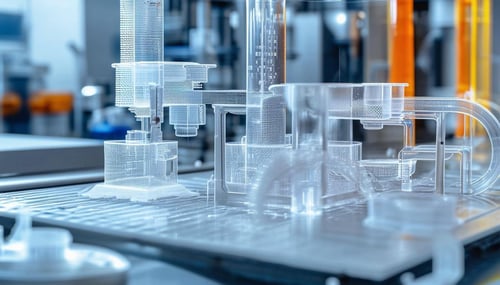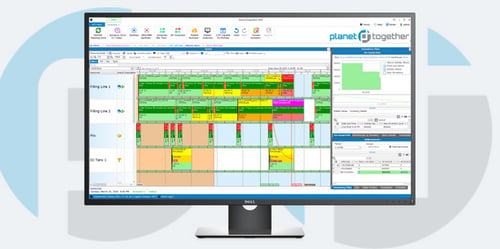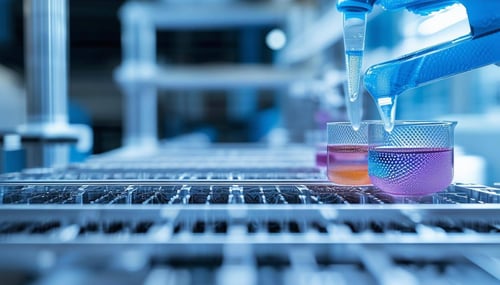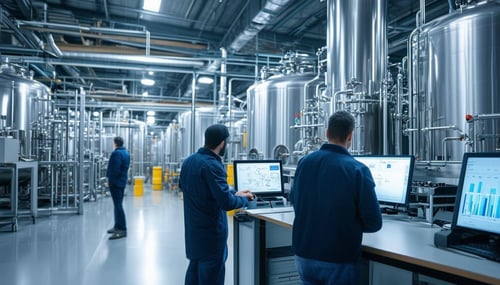Additive Manufacturing in Chemical Production Scheduling: The New Era of Efficiency
The chemical manufacturing industry is no stranger to innovation, constantly evolving to optimize processes, reduce waste, and improve production efficiency. One of the most transformative advancements in recent years is additive manufacturing (AM), commonly known as 3D printing. While AM has gained significant traction in industries such as aerospace, automotive, and healthcare, its applications in chemical manufacturing are now emerging as game-changers, particularly for production schedulers.
With the integration of PlanetTogether APS (Advanced Planning and Scheduling) software and ERP systems like SAP, Oracle, Microsoft, Kinaxis, or Aveva, production scheduling can seamlessly incorporate additive manufacturing, leading to improved flexibility, reduced downtime, and optimized inventory management.

The Role of Additive Manufacturing in Chemical Manufacturing
Additive manufacturing in chemical production is not limited to prototyping—it is actively being used for on-demand parts production, custom catalysts, and advanced filtration systems. Chemical manufacturers can leverage AM to print intricate reactor components, heat exchangers, and even specialized equipment used in production processes.
For production schedulers, the ability to print critical spare parts on demand eliminates dependency on traditional supply chains, reducing lead times and ensuring uninterrupted production. This capability is particularly beneficial for facilities that handle complex chemical formulations, where downtime can result in substantial financial losses and safety risks.

Integrating Additive Manufacturing into Production Scheduling
Integrating additive manufacturing into production scheduling requires a data-driven approach, leveraging PlanetTogether APS in conjunction with ERP systems to streamline operations. Here’s how integration can benefit production schedulers in chemical manufacturing:
Enhanced Production Flexibility
With PlanetTogether APS and SAP (or other ERP systems), production schedules can dynamically adjust based on real-time AM capabilities.
AM enables quick modifications to production plans without waiting for external suppliers to deliver replacement parts or equipment.
Customization and rapid prototyping allow schedulers to respond to changing customer demands without overhauling entire production lines.
Minimizing Downtime and Supply Chain Disruptions
Traditional manufacturing processes depend on external suppliers, making operations vulnerable to supply chain delays.
By integrating PlanetTogether with Kinaxis, chemical manufacturers can incorporate predictive analytics, anticipating supply chain risks and scheduling AM processes accordingly.
On-demand printing of critical components ensures production continuity, significantly reducing unplanned downtime.
Optimized Inventory Management
Oracle ERP integration with PlanetTogether can help automate AM-based replenishment strategies.
Instead of maintaining extensive inventories of spare parts, chemical manufacturers can shift towards an on-demand production model, lowering storage costs and waste.
AM also facilitates Just-in-Time (JIT) production, further reducing excess inventory while maintaining readiness for unexpected breakdowns.
Improved Process Innovation and Quality Control
Microsoft Dynamics 365 integration with PlanetTogether enables real-time tracking of AM-produced components and their performance in production environments.
The ability to rapidly test and refine 3D-printed chemical reactors, catalysts, and filtration components enhances quality control and process efficiency.
Custom-designed AM parts can improve reaction yields and minimize material waste, contributing to overall sustainability goals.
Cost Reduction and Sustainability
The integration of Aveva and PlanetTogether allows manufacturers to track the carbon footprint of AM processes and optimize material utilization.
AM reduces reliance on traditional, energy-intensive manufacturing methods, cutting costs associated with material waste and energy consumption.
By leveraging AM, chemical manufacturers can also recycle and repurpose materials, reinforcing circular economy initiatives.

Real-World Applications in Chemical Manufacturing
Several chemical manufacturers have already started integrating AM into their production scheduling processes. Here are a few practical applications:
Printing Custom Catalysts: Some chemical plants are using 3D-printed catalysts to enhance reaction efficiency and reduce energy consumption. With PlanetTogether’s AI-driven scheduling, these catalysts can be produced on-demand without disrupting the supply chain.
Creating Replacement Parts: Facilities relying on traditional equipment maintenance schedules are shifting to AM-based spare part production, minimizing machine downtime and improving predictive maintenance strategies.
Optimizing Filtration Systems: AM is enabling the production of customized filtration membranes, improving separation processes and ensuring higher purity outputs.
Overcoming Challenges and Ensuring Seamless Integration
While the benefits of additive manufacturing in chemical production scheduling are substantial, there are challenges that need to be addressed:
Material Limitations: Not all chemical-resistant materials are compatible with AM technologies. Research into new 3D-printable chemical-grade materials is ongoing.
Regulatory Compliance: Chemical manufacturing is heavily regulated, and AM-produced components must meet strict safety and quality standards. ERP-integrated compliance tracking helps ensure adherence to industry regulations.
Training and Adoption: Schedulers and operators need training to fully understand the capabilities of AM and how to leverage scheduling software integrations effectively.
For Production Schedulers in chemical manufacturing, additive manufacturing presents an opportunity to redefine traditional production planning. The integration of PlanetTogether APS and ERP Systems allows for the seamless incorporation of AM, improving scheduling agility, reducing downtime, and optimizing inventory.
As the industry moves toward greater digitalization and smart manufacturing, AM will play a crucial role in ensuring resilient, cost-effective, and sustainable chemical production. By embracing this technology today, production schedulers can stay ahead of the competition and drive efficiency in an increasingly complex manufacturing landscape.
Are you ready to take your manufacturing operations to the next level? Contact us today to learn more about how PlanetTogether can help you achieve your goals and drive success in your industry.
Topics: Cost Reduction, PlanetTogether Software, Integrating PlanetTogether, Optimized Inventory Management, Chemical Manufacturing, Minimizing Downtime and Disruptions, Enhanced Production Flexibility





















LEAVE A COMMENT